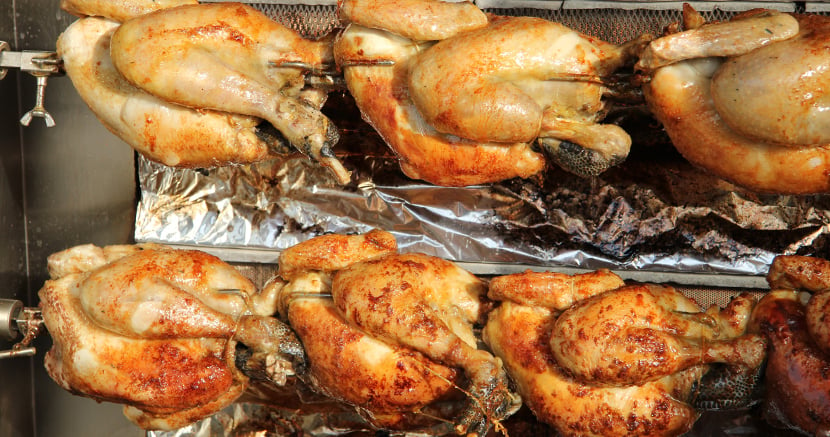The True Price of a $4.99 Rotisserie Chicken
Published Aug 4, 2017

Costco may be a media darling, but its proposed use of contract farming is anything but progressive.
Forbes recently named Costco to its list of the top 10 Fortune 500 companies most loved by liberals. Maybe that’s because Costco CEO Craig Jelinek has championed important causes like a livable wage and company sponsored health benefits. The company’s starting pay is above the federal minimum wage—$13.00 per hour, and the average employee wage is $21 per hour. Nearly 88 percent of employees have company sponsored health benefits. At the height of the recession Costco actually gave raises to help struggling employees.
And yet, despite this commitment to social responsibility, Costco is about to venture into vertical integration and contract farming—a system that is the antithesis of fair. Why? Because Costco sells a lot of rotisserie chickens. So many, in fact, that they’re planning to build their very own chicken slaughterhouse in Fremont, Nebraska where they will slaughter 85 million chickens annually—or about 1.7 million per week. Where will the chickens come from?
Factory farms. And they’re planning to sign up farmers under a contract growing system.
What’s wrong with this? Well, where do we begin…
As Nebraska Communities United points out, this is not your grandparent’s farm. In a system of vertical integration (how the vast majority of chicken is produced in the U.S.) the “integrator” (usually a company like Tyson or Perdue) delivers the chicks and feed and dictates farm operations through a contract. They often require the growers to build and continually upgrade expensive barns to keep obtaining contracts. Farmers generally take out loans lasting more than a decade to pay for this expensive infrastructure, but the contracts are often flock-to-flock, meaning a grower only has guarantee of income for six or seven weeks at a time. The poultry sector is less like a free market than abject serfdom. Contracts are often unfair or abusive and farmers often have no legal recourse against integrators as John Oliver helped expose in this scathing piece on the poultry industry.
Factory farms like the 100 farms Costco plans to have raise its birds also produce a lot of waste which is spread on farmland at levels far exceeding what is needed to fertilize crops. The contract farms are likely to be constructed upstream from the cities of Lincoln and Omaha—and their drinking water supplies. But evidence of the problems factory farms pose isn’t hard to find. Next door in Iowa, the Des Moines Water Works is in a years-long struggle to treat its water for nitrites discharged from the thousands of factory hog farms in counties upstream. And the city of Tulsa, Oklahoma sued upstream chicken producers in Arkansas for polluting its water, resulting in a legal battle that lasted for years.
Since lots of factory farms are exempt from permitting that would protect communities from waste, pollution often runs unchecked into nearby waterways—where it becomes a costly source of contamination in our drinking water supplies. Cheaper rotisserie chicken just simply isn’t worth the cost of healthy drinking water for hundreds of thousands of people.
We’ve seen this again and again: Corporations, even ones that try to do well by consumers, workers and the environment, fall down when it comes to sourcing their products. But if Costco wants to live up to its progressive bona fides, factory farming isn’t the way to do it.
Ultimately, we need to call on our elected officials to do their jobs: protecting the public’s health. The Lincoln City Council and the mayor need to take action to stop this slaughterhouse, and the City of Omaha should take a hard look at these issues as well—sooner rather than later.
Enjoyed this article?
Sign up for updates.
TO TOP




